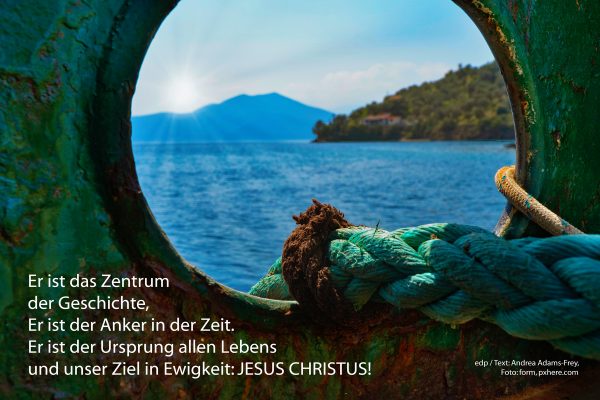 [nx_spacer size=”5″]Beim Lesen von Daniel Kap. 8 habe ich drei Punkte festgehalten:
[nx_spacer size=”5″]Beim Lesen von Daniel Kap. 8 habe ich drei Punkte festgehalten:
(1) Als Daniel die Erklärung seiner Vision bekam, wurde er ohnmächtig. Am Ende steht, dass er völlig erschöpft und tagelang krank war. Was ihn am meisten erschütterte, war, dass Gott angegriffen und seine Wahrheit in den Dreck gezogen wurde.
Macht uns das Leid auf dieser Welt zu schaffen? Das ist gut: Wir sind noch nicht abgestumpft! Aber wie betroffen machen uns die Gottlosigkeit und die Ablehnung Gottes und seiner Angebote?
(2) Im „kleinen Horn“ haben die Reformatoren Rom erkannt, und zwar sowohl das heidnische als auch das päpstliche Rom.
Die Kritik galt (und gilt) aber nicht einzelnen Gläubigen, sondern einem System, das die Alleingeltung der Heiligen Schrift verneint, eine menschlich-priesterliche Vermittlung propagiert und die Person Jesu Christi und sein einmaliges und für immer ausreichendes Opfer am Kreuz verdunkelt.
(3) Ein Kernsatz in diesem Kapitel ist die Frage, die vielen Christen unter den Nägeln brennt: WIE LANGE NOCH? Wir sehnen uns nach Klärung, nach einem Machtwort, nach der Rehabilitierung verfolgter Gläubigen, nach dem gerechten Urteilspruch, nach der Beseitigung des Bösen, nach der Wiederherstellung des verlorenen Paradieses …
Wie lange noch müssen wir darauf warten? Diese Frage darf man stellen. Sie ist kein Zeichen des Unglaubens, sondern der Sehnsucht nach Gott.
![]()
How long? (Daniel 8)
While reading Daniel chapter 8 I noted three points:
(1) When Daniel received the explanation of his vision, he collapsed. In the end, he was completely exhausted and sick for days. What shook him the most was that God was attacked and his truth was dragged in the mud. Does the suffering in this world cause us pain? That’s good: We are not yet jaded! But how affected are we by godlessness and the rejection of God and his offers?
(2) In the “little horn” the Reformers recognized Rome, both pagan and papal Rome. However, the criticism was (and still is) not directed at individual believers, but at a system that denies the uniqueness of Holy Scripture, propagates a human-priestly mediation and obscures the person of Jesus Christ and his unique and forever sufficient sacrifice on the cross.
(3) A key sentence in this chapter is one question of burning importance to many Christians: “How much longer? We are longing for clarification, for a word of authority, for the rehabilitation of persecuted believers, for the just judgment, for the elimination of evil, for the restoration of the lost paradise … How much longer must we wait? It is a question that is legitimate to ask. It is not a sign of unbelief, but of longing for God. (Foto)
![]()
¿Cuánto tiempo falta? (Daniel 8)
De la lectura del cap. 8 de Daniel he sacado tres conclusiones:
(1) Cuando Daniel recibió la explicación de su visión, se desmayó. Al final, estaba completamente exhausto y enfermo durante días. Lo que más lo conmocionó fue que Dios fuera atacado y su verdad fuera arrastrada por el barro. ¿El sufrimiento en este mundo nos causa dolor? Eso es una buena señal de que aún no estamos insensibilizados. ¿Pero cuánto nos afecta el ateísmo y el rechazo de Dios y sus ofertas?
(2) En el “cuerno pequeño” los reformadores reconocieron a Roma, tanto la Roma pagana como la papal. Sin embargo, la crítica no se dirigió (ni se dirige) a los creyentes individuales, sino a un sistema que niega la exclusiva autoridad de las Sagradas Escrituras, que propaga una mediación humano-sacerdotal y que oscurece la persona de Jesucristo y su sacrificio único y para siempre suficiente en la cruz.
(3) Una frase clave en este capítulo es la pregunta que da bastante que pensar a muchos cristianos: “¿Cuánto tiempo falta?” Anhelamos una solución, una sentencia definitiva, la rehabilitación de los creyentes perseguidos, el juicio justo, la eliminación del mal, la restauración del paraíso perdido… ¿Cuánto tiempo más debemos esperar? Es una pregunta permitida. No es una muestra de incredulidad, sino de un gran anhelo de vivir para siempre en la presencia de Dios. (Foto)


